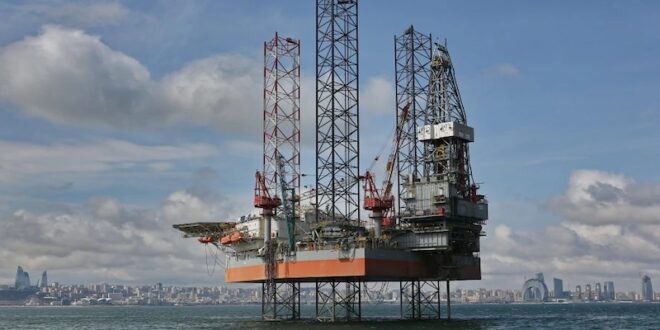Oil from Azerbaijan’s giant ACG oil field in the Caspian Sea briefly resumed flowing through the Baku-Supsa pipeline to the Georgian Black Sea coast for the first time in 10 months after a halt due to the Russia-Ukraine war.
BP, which operates both the ACG field and the Baku-Supsa pipeline, confirmed to Eurasianet on February 21 that flow had been restarted, with one tanker having collected a cargo over the previous weekend and a second tanker due to collect its cargo later in the week.
Flow through the pipeline was halted last year, first temporarily in March and then permanently in May, due to fears over the safety of shipping in the Black Sea following reports of free-floating mines. Exports were re-routed via the Baku-Tbilisi-Ceyhan (BTC) pipeline through Turkey.
While the restart of the flow of oil to Supsa should have been good news for both Azerbaijan and Georgia, whose ports have suffered considerably from loss of trade, the move is only temporary.
BP said that flow to Supsa was restarted only as a result of the six-day closure of the BTC pipeline’s export terminal at Ceyhan, on Turkey’s Mediterranean coast, due to the earthquakes that hit nearby on February 6.
And it will only restart again as and when shipping companies are willing to brave the risks posed by operating in the Black Sea.
One year on from the start of Russia’s invasion of Ukraine, Azerbaijan’s oil sector is continuing to feel the impact of a conflict that shows no signs of ending.
Prior to the war, exports of Azerbaijani crude flowed to international markets through three separate pipelines, Baku-Supsa, BTC, and the Baku-Novorossiysk line through the Caucasus to Russia’s Black Sea port of Novorossiysk.
Flow through that third pipeline was also halted last year, for the same reasons, with the oil again re-routed through BTC.
Azerbaijani President Ilham Aliyev said last October that he wanted to see exports of oil through the Baku-Supsa pipeline restarted. But that hasn’t been possible given ongoing security concerns in the Black Sea (except for the two tanker loads just announced).
With just the one pipeline operating, Azerbaijan was indeed fortunate that the damage to Turkey’s Ceyhan terminal caused by the earthquakes was not more serious.
Increased gas exports to Europe have begun to help diversify Baku’s sources of income but oil remains the country’s main earner.
Azerbaijan’s earnings from oil and gas exports over the first 11 months of last year totalled $33.6 billion, accounting for 92.6 percent of the country’s total revenues.
Revenue was boosted in part by higher oil prices caused by Russia’s invasion of Ukraine, but risks remain from relying on a single pipeline to a single terminal in an area of Turkey that is prone to seismic activity and continues to experience aftershocks.
Azerbaijan’s oil supply is also declining as the country’s Caspian fields reach maturity and require careful management to eke out production.
Baku only releases partial data on oil production and exports and has not released a full comparison for 2022 against 2021.
The limited data released suggest average daily production for 2022 was down around 5.6 percent on 2021, and exports down around 6.3 percent.
In order to offset falling production and boost revenues, Azerbaijan’s state oil company SOCAR has for several years been transiting oil from its Caspian neighbours Turkmenistan, Kazakhstan and Russia through the BTC pipeline.
Baku received a boost in November with the news that Kazakhstan would this year begin to increase its exports via BTC.
However that was followed in December by the start of the European Union’s ban on the import of oil from Russia by tanker, which ruled out Russian oil arriving at Ceyhan by pipeline and continuing to EU refineries by sea.
BP, which is the biggest shareholder in BTC and operates the pipeline’s Baku terminal, confirmed to Eurasianet on February 24 that the pipeline no longer carries any Russian oil.
The effects of that change are already apparent.
Data from Turkey’s state pipeline operator Botas, which operates the Turkish section of the BTC line, shows that in January the volume of oil the pipeline carried was down 7.4 percent on the previous month and down 9.5 percent on January 2022.
Oil flow through the BTC pipeline last year, however, was up 12.5 percent and 8.2 percent on the COVID years of 2020 and 2021, when global oil demand fell sharply and Baku was obliged to follow OPEC-imposed production cuts.
But it was also down 14 percent on the 2015 number, which was the highest flow recorded in the past 12 years.
One positive result for Azerbaijan is that falling production and exports coupled with high global prices is resulting in greater investment in exploration for new reserves.
BP announced last month that it would drill new exploration wells aimed at finding new oil and gas reserves.
 Eurasia Press & News
Eurasia Press & News


